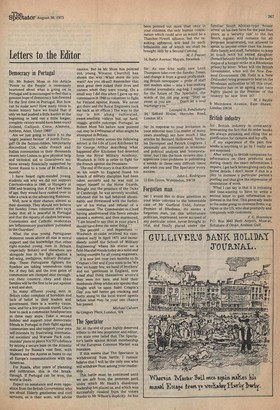Democracy in Portugal
Sir: Mr Robert Moss in his Article 'Power to the People' is immensely heartened about what is going on in Portugal and is encouraged to feel that a genuine hope of democracy has dawned for the first time in Portugal. But how can he make sure? How many times in recent history have we found that if only we had pushed a little harder at the beginning or held out a little longer, complete victory would have been ours? Jutland, Gallipoli, Crete, Alamein, Arnhem, Aden, Ulster 1969?
Are we just going to leave it to the 'angry peasant farmer' of north Portugal? Or the faction-ridden, temporarily discredited CIA, while French and Italian communists in their thousands swarm into Lisbon to give physical help and technical aid to Goncalves's minions already financially supported by Soviet Russia to a tune of $4 million a month?
I have heard right-minded young students ask why we did not support Czechoslovakia in 1948, or Hungary in 1956 and boasting that if they had been of age, they would have rushed over to take a crack at the advancing Russians.
Well, now is their chance, almost at their doorstep. They should not believe the Sunday Times columnist who says today that all is peaceful in Portugal and that the reports of clashes between Communists and Catholic moderates are 'inflammatory journalism' published in the Guardian!
What the true young Portuguese democrat needs above all else is moral support and the knowledge that other right-minded young men in Britain (especially Britain) and elsewhere are alongside him in his fight against a left-wing, irreligious, military dictatorship. These Portuguese fighters for freedom are taking tremendous risks for, if they fail, and the iron gates of communism are clamped shut throughout their country, they and their families will be the first to be put against a wall and shot.
So many affluent young men in Britain today complain of boredom and lack of belief in their leaders and government. Here is a worthy cause, now, and for a few pounds travel. Learn how to sack a communist headquarters in three easy steps. Take a second holiday and support your democratic friends in Portugal in their fight against communism and also support your own self-interests by frustrating international socialists' and Warsaw Pack communists' plans to pierce NATO's defence by seizing a secure base on the Atlantic seaboard for Russia's vast fleet, with Madeira and the Azores as bases to cut all Europe's communications with the Americas.
For Russia, after years of planning and infiltration, this is the breakthrough. If Portugal can be won, the world is theirs.
Expect no assistance and even opposition from the British Government who are afraid. Elderly gentlemen and civil servants, as is their wont, will advise caution. But as Mr Moss has pointed out, young Winston Churchill has shown the way. What more do you want? Are you afraid? Remember that most great men risked their lives and careers when they were young. (In a small way I did this when I gave up my commission in 1940 to volunteer to fight for Finland against Russia. We never got there and the Royal Engineers took me back as an officer.) The way to the top is not along cultivated, sweet-smelling valleys but up hard, craggy, granite outcrops. Portugal, as Robert Moss has before now pointed out, may be a rehearsal of what might be attempted in Britain.
I recently came across the following extract in the Life of Lord Kitchener by Sir George Arthur describing what happened after Kitchener had deserted from the Royal Military Academy, Woolwich in 1870 in order to fight for the French against the Prussians: 'The end of the story is that Kitchener on his return to England found his breach of military discipline had been taken seriously and he was told to report himself to the Horse Guards. Brought into the presence of the Duke of Cambridge, he was severely scolded, informed that he had behaved abominably, and threatened with the forfeiture of his Status and refusal of a commission. The Commander-in-Chief having administered this fierce rebuke paused a moment, and then murmured, "I am bound to say that in your place I should have done the same thing."' The peccant — and impenitent — Woolwich ex-cadet received his commission early in April 1871 and immediately joined the School of Military Engineering' where his statue as a field-Marshal stands today as a solid and lasting example for all young engineers.
It is now just over two months to St Crispian's Day and if you want to be 'We few, we happy few, we band of brothers' and not 'gentlemen in England, now a-bed shall think themselves accurs'd they were not here, and hold their manhoods cheap whiles any speaks that fought with us upon Saint Crispin's Day' you had better get cracking and hurry along to the local travel agents before what may be your one chance has passed.
Michael Calvert 6a Gregory Place, London, W8


































 Previous page
Previous page